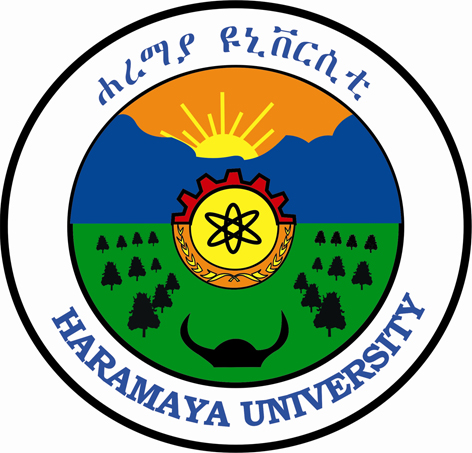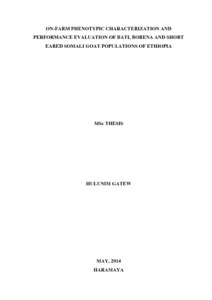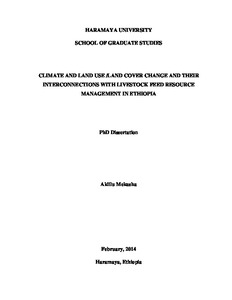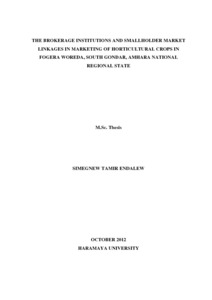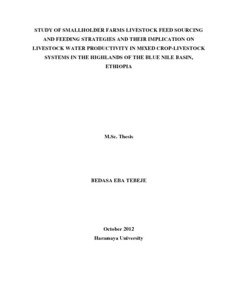Location
Vision
Haramaya University strives to be one of the leading African Universities with international reputation by 2025.
Mission
The Mission of Haramaya University is to produce competent graduates in diverse fields of study, undertake rigorous, problem solving and cutting edge researches,disseminate knowledge and technologies, and provide demand-driven and transformative community services.
Motto
The motto of Haramaya University is “Building the Basis for Development”
Goal
The goal of Haramaya University is to evolve as an autonomous and independent (academic and research institution) graduate and research university with a competitive national and international quality and relevance standards in its academic, research and community services endeavours.
Members:
Resources
Displaying 16 - 20 of 36On-farm phenotypic characterization and performance evaluation of Bati, Borena and short eared Somali goat populations of Ethiopia
The objectives of this study were to describe the production systems, the morphological features, and growth and reproductive performances of Bati (Central Highland ecotype), Borena (Long eared Somali ecotype) and Short-eared Somali indigenous goat populations in their home tract, Ethiopia. The study covered Bati and Kalu districts for Bati goats in Oromiya and South Wollo zones (Amhara Region), respectively; Yabello for Borena goats in Borena zone (Oromia Region); and Shinille and Erer from Siti (the previous Shinille zone, in Somali Region) for Short-Eared Somali goats.
Climate and land use land cover change and their interconnections with livestock feed resource management in Ethiopia
We assessed land use/ land cover changes from remotely sensed satellite imagery and compared this with households perceptions on availability/use of livestock feed resources and feed deficit management strategies since the 1973 in three districts representing the pastoral, agro-pastoral and mixed crop-livestock eco-environments of Ethiopia.
The impacts of brokerage institutions in the marketing of horticultural crops in Fogera District
The brokerage institutions and smallholder market linkages in marketing of horticultural crops in Fogera woreda, south Gondar, Amhara National Regional State
The main objective of this study was to analyze the economic roles played by the brokerage institutions in smallholder market linkages to the wholesalers in vegetable marketing and determinants of decisions on whether to use brokerage institutions or not under imperfect market condition in Fogera Woreda, North Western Amhara Region particularly focusing on onion and tomato. Both secondary and primary data were collected for the study. Primary data were collected from a very wide number of respondents at all stages of the market channel where brokers are expected to play role.
Study of smallholder farms livestock feed sourcing and feeding strategies and their implication on livestock water productivity in mixed crop-livestock systems in the highlands of the Blue Nile Basin, Ethiopia
This study was conducted to assess livestock feed sourcing and feeding strategies and their implications on livestock water productivity (LWP) in mixed crop-livestock production systems of the Blue Nile Basin (BNB) in Ethiopian Highlands. Three Woredas (Diga, Jeldu and Fogera) representing diverse agricultural farming systems were considered. One watershed in each Woreda, which is Dapo from Diga, Meja from Jeldu and Mizuwa from Fogera were selected. Each watershed further stratified to different farming systems depending on cropping pattern and landscape positions.

